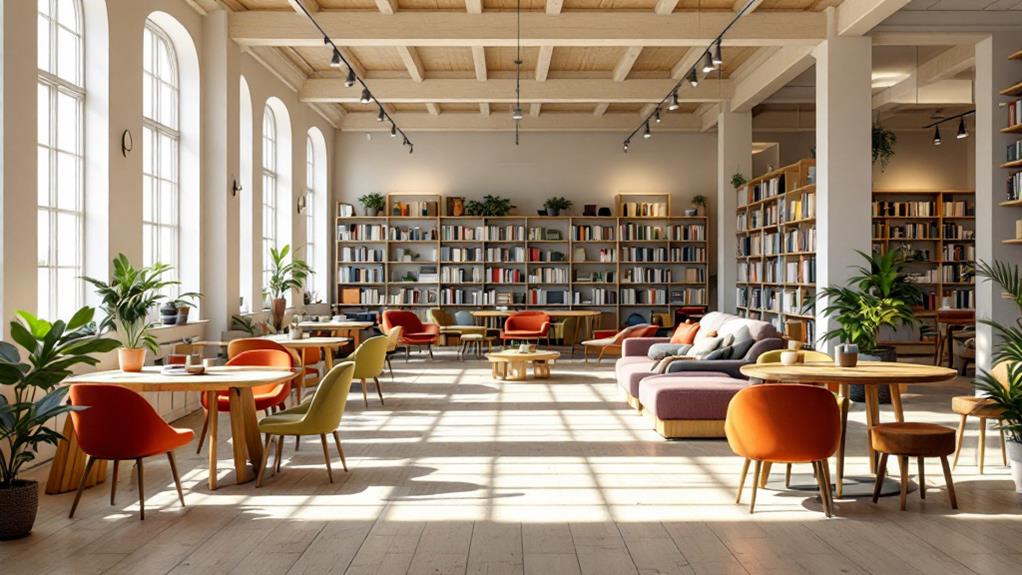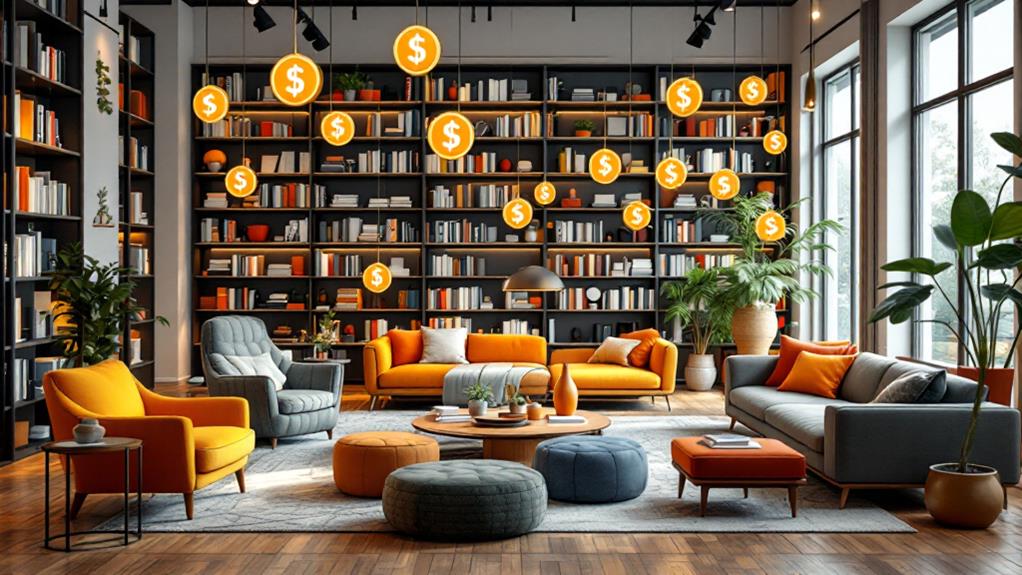When you purchase large quantities of furniture for libraries, you can benefit from substantial cost savings, sometimes up to 30% off retail prices. Wholesale purchases generally cut out middleman expenses, allowing you to manage budgets more effectively while obtaining bulk discounts and customizing options. Libraries can choose from diverse product types, including traditional and modern styles, ensuring durability and sustainability through eco-friendly materials. Efficient delivery systems minimize disruptions by collaborating with reliable carriers and implementing streamlined logistics. Engaging with transparent return policies and warranties also builds trust. Expanding on these insights can further underscore strategic procurement benefits.
Advantages of Wholesale Purchases

When you're buying furniture for libraries, going the wholesale route offers numerous advantages.
To start, wholesale suppliers provide an extensive range of customization options. This means you can tailor your library's environment to meet specific needs and reflect its unique identity. You'll find it easier to choose from a variety of styles and finishes, ensuring that the furniture aligns with your library's aesthetic and functional requirements.
Additionally, purchasing in bulk allows for significant cost savings, making it a budget-friendly option for large-scale projects.
Another significant advantage is the fast delivery and efficient logistics offered by wholesale suppliers. This efficiency is essential when you're facing tight deadlines for new openings or renovations. By partnering with a reliable wholesale supplier, you can minimize disruption to your library's operations, ensuring a smooth change or upgrade.
Additionally, many wholesale suppliers focus on sustainability, allowing you to align your library with eco-friendly practices. This can be particularly appealing to environmentally conscious patrons.
Cost Savings and Discounts
Beyond the advantages of customization and sustainability, purchasing furniture wholesale offers considerable cost savings and discounts that can't be overlooked. When you buy in large quantities directly from wholesale suppliers, you can greatly cut costs by eliminating middleman expenses. This approach can lead to savings of up to 30% compared to traditional retail prices. Such savings are essential for libraries operating within tight budgets, allowing more financial resources to be allocated elsewhere.
Many wholesale furniture suppliers provide bulk purchasing discounts, further enhancing budget management. These discounts are particularly beneficial when you're furnishing multiple spaces at once. By taking advantage of competitive pricing on high-quality, handcrafted furniture, libraries guarantee they receive durable and attractive furnishings without exceeding financial limitations.
Stocking up on inventory during these bulk purchases also positions you to effectively manage future needs, avoiding additional costs down the line. Cost-effective large-scale furnishing projects not only save money but also maintain a cohesive aesthetic throughout library spaces. This enhances the overall user experience, offering a pleasant and unified environment.
Consequently, purchasing wholesale is a strategic financial decision that balances cost savings with quality and design consistency.
Diverse Product Options

With an expansive array of choices, wholesale furniture suppliers offer libraries an extensive selection of options to suit every need. You'll find everything from bookshelves and study tables to a variety of seating options, all designed to meet diverse design and functional requirements.
These suppliers cater to libraries seeking both traditional and modern styles, guaranteeing that each piece not only fits the space but also enhances the overall user experience.
Many suppliers provide curated collections specifically crafted for libraries. These collections feature ergonomic designs and durable materials ideal for high-traffic environments, guaranteeing longevity and comfort.
If you're concerned about sustainability, many options focus on eco-friendly materials, allowing libraries to maintain functionality while creating environmentally responsible spaces.
Bespoke orders are also available, accommodating unique library layouts. This flexibility enables libraries to create distinctive spaces tailored to their specific needs.
Whether you're looking to furnish a small reading corner or an expansive study area, the variety of available products guarantees there's something for every requirement.
Wholesale suppliers' commitment to providing diverse options helps libraries maintain both aesthetic appeal and practical utility, ultimately enhancing the library-goer's experience.
Customization Opportunities
Customization transforms library spaces into unique environments that reflect their community's specific needs and personalities. With extensive customization options, you can tailor furniture designs, colors, and finishes to align with your library's branding and aesthetic goals. This level of personalization not only strengthens your library's identity but also enhances its appeal to patrons.
When purchasing furniture in large quantities, consider bespoke orders for unique pieces. Modular seating and specialized shelving can be crafted to meet your library's specific requirements, offering flexibility and functionality. Collaborating closely with suppliers allows you to develop tailored solutions, guaranteeing that the furniture not only fits the space but also supports its intended use.
Keep in mind that minimum order quantities might apply when opting for custom items. This can be both a strategic and cost-effective approach, enabling you to achieve a distinct look while managing budgetary constraints.
Customization doesn't just help your library stand out; it also addresses diverse community needs, making spaces more inviting and accessible. By embracing these opportunities, you make sure your library remains a dynamic and welcoming environment, tailored to serve its patrons effectively.
Efficient Delivery and Logistics

When investing in library furniture, efficient delivery and logistics play an important role in guaranteeing that everything arrives on time and within budget. Streamlining shipping processes for large furniture orders can greatly reduce lead times compared to traditional retail methods.
By collaborating with reliable carriers, you can guarantee timely delivery, which is vital for projects with tight deadlines, such as outfitting libraries.
Direct fulfillment from manufacturers is another strategy that minimizes inventory costs and accelerates the overall delivery timeline, enhancing efficiency for large-scale orders. This method allows you to maintain control over inventory management during the delivery process, mitigating potential shipping costs and logistical complexities associated with large orders.
Moreover, clear communication regarding shipping timelines and assembly options is important. Whether you choose self-assembly or professional setup, this information helps improve planning for library installations.
Knowing when and how your furniture will be delivered allows you to better coordinate with other aspects of your project, guaranteeing a smoother installation process.
Building Trust With Customer Service
Establishing trust with exceptional customer service is vital for libraries making significant furniture investments. When you're purchasing large quantities, knowing that your provider offers a transparent return policy is essential. This reduces hesitation, making you feel confident about the investment. Clear warranty details further guarantee you about the furniture's quality and longevity, enhancing your institution's reputation through reliable choices.
An invaluable aspect of building trust is actively engaging with online reviews. By encouraging and responding to feedback, you gain insights into the service quality and product satisfaction. This input can heavily influence your decision-making, guiding you towards reputable providers.
Prompt attention to customer concerns is another important element. When issues arise, responsive service demonstrates a provider's commitment to your unique needs, fostering loyalty and satisfaction. This is especially important with large orders, where complexities can occur.
Here's a quick overview of key trust-building elements:
| Element | Benefit | Result |
|---|---|---|
| Transparent Return Policy | Builds confidence | Reduces hesitation |
| Clear Warranty Details | Guarantees quality reassurance | Enhances reputation |
| Responsive Service | Addresses concerns effectively | Fosters loyalty |
Exceptional service experiences often lead to repeat business, turning positive interactions into referrals to other institutions.
Return and Warranty Guidelines

In purchasing library furniture, understanding return and warranty guidelines is essential to ensuring a smooth transaction process. Typically, return policies permit returns only for manufacturing defects, not for items damaged during transit. This policy underscores the need for careful inspection upon delivery.
As a trade customer, you're responsible for collecting returned items, so accurate ordering is vital to avoid unnecessary complications. Clear guidelines on acceptable returns are provided to minimize misunderstandings, ensuring the return process is straightforward and efficient.
Warranty details are clearly outlined, offering reassurance about the quality and durability of your furniture purchases. Knowing these details helps you understand what protection you have if issues arise post-purchase.
Emphasis on quality control reduces defects, enhancing customer satisfaction and decreasing the likelihood of returns. By familiarizing yourself with these guidelines, you can make informed decisions, ensuring that any potential issues are handled effectively.
Proper knowledge of return and warranty guidelines not only protects your investment but also helps maintain a positive relationship with suppliers. By prioritizing quality and understanding your rights and responsibilities, you can enjoy a seamless experience when buying furniture for libraries.
Embracing Sustainability Practices
While buying library furniture, embracing sustainability practices not only supports environmental stewardship but also aligns with community values. Sourcing sustainably harvested wood guarantees responsible forestry practices, appealing to eco-conscious patrons who appreciate the library's commitment to the environment. This strategy supports the well-being of forest ecosystems, promoting biodiversity and reducing deforestation.
Using recycled materials in furniture production considerably lowers the carbon footprint of library furnishings. By integrating recycled content, you contribute to community sustainability goals and demonstrate leadership in reducing waste. Emphasizing the use of non-toxic finishes and adhesives further enhances indoor air quality, creating healthier spaces for both staff and visitors.
Implementing recycling or disposal programs for old furniture encourages a circular economy, minimizing waste and promoting environmental responsibility. When you replace old items, make sure they're either recycled or repurposed, supporting sustainable waste management practices.
Highlighting eco-friendly materials in marketing materials can also attract funding. Environmentally-focused organizations and grant programs often support initiatives that prioritize sustainability. By showcasing your commitment, you increase the likelihood of securing financial backing, enhancing the library's capacity to invest in sustainable resources.
Embracing these practices positions your library as an environmentally responsible institution.
Flexible Financing Solutions

Balancing sustainability with budget constraints is key when purchasing library furniture. Flexible financing solutions can make a considerable difference, enabling you to spread costs over time. This approach helps manage your budget while still acquiring the essential furnishings needed for your library. Collaborating with reputable financing entities enhances payment flexibility, providing you with broader furniture options that fit within budget constraints.
To guarantee secure transactions, utilize trusted payment gateways. This fosters trust and encourages investment in quality furniture without financial concerns. Highlighting available financing options in your marketing materials can empower libraries to understand their purchasing power, ultimately driving more informed decisions.
Offering tailored payment solutions for large orders can considerably boost your sales conversions. Libraries often require substantial quantities of furniture, and flexible financing plans are a game-changer in meeting these needs.
| Financing Option | Benefits | Considerations |
|---|---|---|
| Installment Plans | Spreads cost over time | Interest rates may apply |
| Leasing Agreements | Lower upfront costs | Long-term commitments |
| Deferred Payment | Delays payments initially | Possible fees or interest |
| Bulk Purchase Discounts | Cost savings on large orders | Initial higher expenditure |
Frequently Asked Questions
How Can Libraries Ensure Furniture Meets Accessibility Requirements?
Make certain your library's furniture meets accessibility requirements by choosing adjustable-height tables and desks, using materials with non-slip surfaces, and creating clear pathways. Regularly seek feedback from users with disabilities to identify and address any accessibility concerns.
What Considerations Should Be Made for Furniture Maintenance in Libraries?
You should prioritize regular cleaning and use durable materials for library furniture. Implement a maintenance schedule for inspections, apply protective coatings, and train staff on proper care. This guarantees longevity and minimizes costly repairs or replacements.
Are There Recommendations for Furniture Arrangement to Optimize Library Space?
You should focus on creating clusters for collaboration and modular setups for flexibility. Use multi-functional pieces for efficiency, designate zones for varied activities, and guarantee clear pathways for accessibility to optimize library space effectively.
How Can Libraries Assess the Durability of Different Furniture Materials?
You can assess furniture durability by checking abrasion resistance scores, like the Martindale test. Prioritize hardwoods and metal components over softwoods and plastics. Evaluate finishes for water resistance and consider environmental impacts on material longevity.
What Role Does Furniture Play in Enhancing Library Acoustics?
Furniture plays an essential role in library acoustics by absorbing sound with materials like foam and fabric. You can strategically place bookshelves, carpets, and drapes to minimize sound transmission, creating a serene, quieter environment for patrons.


